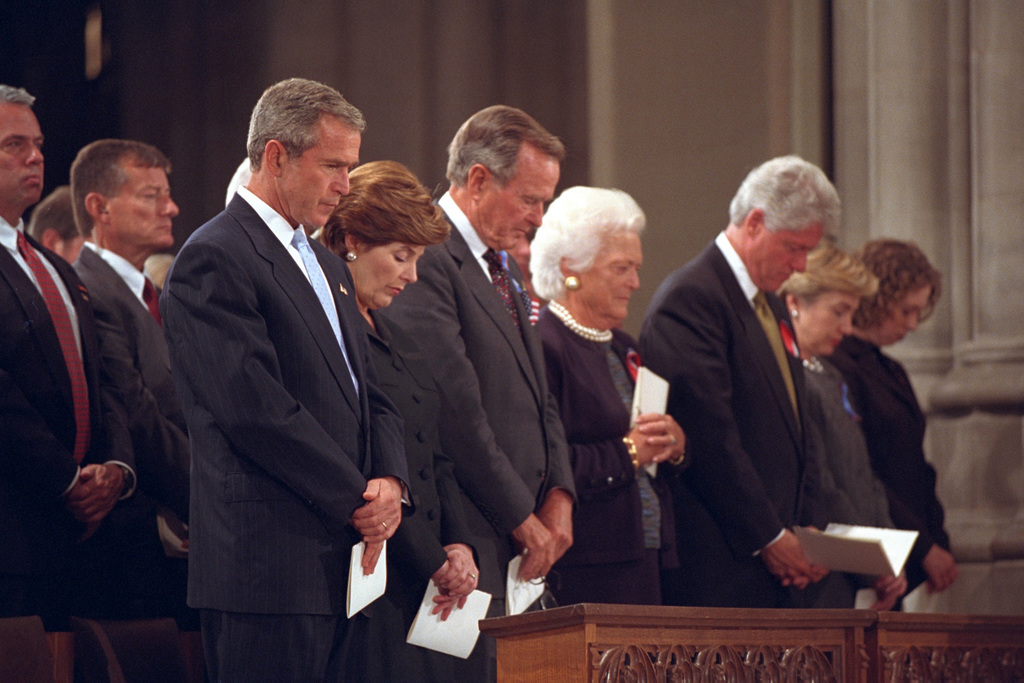Excellent rhetoric, mistaken diagnosis
By David Isenberg, UPI Outside View Commentator
First of two parts
WASHINGTON — The Bush administration’s latest version of the “National Strategy for Combating Terrorism” represents yet another perversion of reality.When introducing the new strategy at the White House this month President Bush said: “History teaches that underestimating the words of evil and ambitious men is a terrible mistake. In the early 1900s, an exiled lawyer in Europe published a pamphlet called ‘What Is To Be Done?’ in which he laid out his plan to launch a communist revolution in Russia. The world did not heed Lenin’s words, and paid a terrible price. The Soviet Empire he established killed tens of millions, and brought the world to the brink of thermonuclear war. In the 1920s, a failed Austrian painter published a book in which he explained his intention to build an Aryan super-state in Germany and take revenge on Europe and eradicate the Jews. The world ignored Hitler’s words, and paid a terrible price. His Nazi regime killed millions in the gas chambers, and set the world aflame in war, before it was finally defeated at a terrible cost in lives.”
As political rhetoric it was excellent; consistent with recent speeches by the president, Vice President Dick Cheney, and Secretary of Defense Donald Rumsfeld at the Veterans of Foreign Wars Convention, who in not very subtle speeches essentially said that those who opposed the U.S. war in Iraq and the Bush administration’s long war against Islamic terrorists were fascist-friendly cowards.
But as an actual operational blueprint for effectively preventing Islamic terrorism the rhetoric leaves much to be desired. But then again so does the strategy itself. The problem is that it is wrong in substance, both in the diagnosis of the problem and in exaggerating American ability to deal with it.
The problem can be seen in the very first paragraph. It states: “America is at war with a transnational terrorist movement fueled by a radical ideology of hatred, oppression, and murder. Our National Strategy for Combating Terrorism, first published in February 2003, recognizes that we are at war and that protecting and defending the Homeland, the American people, and their livelihoods remains our first and most solemn obligation.”
Wrong on three levels
This is wrong on three levels. First, America is not at war. True, it is fighting wars in Afghanistan, Iraq, and elsewhere, but the country itself is not at war. There was no declaration of war by the U.S. Congress and there is no sense of urgency or war-related sacrifice among the population.Second, the “transnational terrorist movement” conflates many different groups who are tenuously, if at all, connected to al-Qaida or inspired by its ideology. According to an article in the current issue of International Security journal, of the 42 groups currently designated as Foreign Terrorist Organizations by the U.S. State Department, 31 seek regime change, 19 seek territorial change, four seek policy change, and one seeks to maintain the status quo. None appear to pursue social control. To write that they are fueled by “hatred, oppression, and murder” is akin to saying they hate America for its freedoms. It’s a nice sound bite but it ignores the groups’ specific and differing goals. To imply that such disparate groups as the Islamic Movement of Uzbekistan, Abu Sayyaf in the Philippines, Hezbollah in Lebanon and Lashkar I Jhangvi in Pakistan are united in a “transnational terrorist movement” defies reality.It also violates what Chinese strategist Sun Tzu wrote in his classic book “On The Art of War”: “If you know yourself but not the enemy, for every victory gained you will also suffer a defeat.”
The report also says that terrorist groups have a “common goal of ushering in totalitarian rule.” While this is similar to talk that the right wing has been putting forth recently about “Islamofascism” — a contradictory phrase to begin with — there is little evidence for it.
Fascism is generally and broadly defined as a political system in which the state represents the highest value, to which all other values and needs must be subordinated. Islamism, even in its most militant form, refers to a politico-religious philosophy that considers submission to the will of God as the value to which all other values must be subordinated.
It is logically impossible for religious values to be subordinated to the needs and values of the state while at the same time the needs and values of the state are subordinated to the dictates of Islam as a religious faith.
While the reference to totalitarian rule may be inappropriate, it is no accident. Introducing fascism, a form of totalitarianism, into the public debate is designed to create a connection with World War II.
—
David Isenberg is a senior research analyst at the British American Security Information Council, a member of the Coalition for a Realistic Foreign Policy, and an adviser to the Straus Military Reform Project of the Center for Defense Information in Washington, D.C. These views expressed in this commentary are his own.
—
United Press International’s “Outside View” commentaries are written by outside contributors who specialize in a variety of important issues. The views expressed do not necessarily reflect those of World Peace Herald or United Press International. In the interests of creating an open forum, original submissions are invited.

